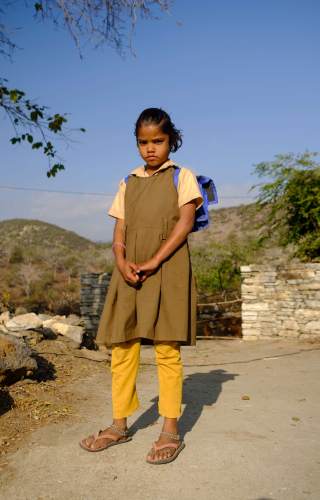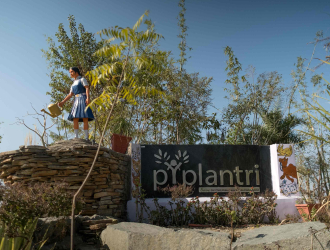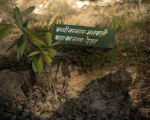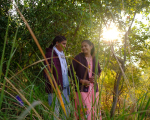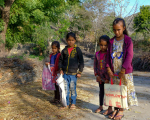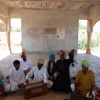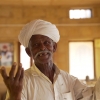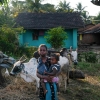During the nationwide lockdown in 2020, I was researching on sustainable gardening practices to create a kitchen garden on my balcony. An article on Shri Shyam Sundar Paliwal grabbed my attention. He, along with Bhavar Singh ji and Kala Devi ji, started an initiative of afforestation every time a girl child was born in Piplantri village, in Rajsamand district, Rajasthan. A former sarpanch (village head), Shyam Sundar Paliwal had started this drive, in the aftermath of the death of his young daughter, Kiran, due to dehydration. In 2006, he planted a kadam sapling in her name and later thought of making this a tradition upon the birth of any girl child in the village.
My ancestors were from Rajasthan, from a village in the Pali district. When I read about Piplantri, it sparked my interest because I was familiar with the social challenges the girl child faces in Rajasthan, and I wanted to see how Piplantri was addressing this problem. I travelled to Udaipur, took a government bus to Rajsamand city, and from there an autorickshaw to Piplantri. On approaching the village, I noticed lush green vegetation all around, which is in stark contrast to the scarred landscape around it. A board with the names of all the girl children born in the year was put up at the entrance. I put up at a guest house established by the Gram Panchayat to accommodate visitors. My familiarity with spoken Marwari helped communicate with the locals, who explained to me the various ways in which Piplantri has turned a new chapter in eco-feminism in an Indian context.
It is a tragic reality that female infanticide and female foeticide is still practised in India. Rajasthan is no exception. Preference for boys during childbirth has led to a skewed sex ratio. This discrimination continues in matters of marriage, job, health and education, where boys are given more rights than girls, who are considered an economic liability. At Piplantri, several initiatives have been undertaken to counter such age-old prejudices. When a girl child is born, villagers plant 111 saplings in her name. A fixed deposit account is opened (under Pradhan Mantri Sukanya Yojana), partly funded (Rs. 10,000) by the girl’s parents and partly by a joint contribution of villagers (Rs. 21,000), which can be withdrawn only after she turns 18 years old. They have to sign an affidavit that no girl will be married as a minor. A monetary incentive is given to the families of girls who complete their school education, so now parents are inclined to let daughters attend school regularly. This initiative also helped prevent child marriage, which is a widespread practice in Rajasthan even today. Women are also encouraged to give birth at a hospital to reduce the health risk to the mother and newborn, and to prevent female infanticide.
Another problem Piplantri face is large-scale mining activities around the village. Open-cast mines and dump yards are seen everywhere. Every 15 minutes—through the day and through the night—one can hear blast explosions. Unregulated mining has led to deforestation, environmental degradation, and loss of natural habitat for flora and fauna. Mining companies dump marble waste on land, which they purchased from villagers who are easily pursued to give away land in exchange for monetary compensation. Eventually, this loss of traditional occupation has forced locals to migrate to cities looking for alternative jobs.
Earlier, these dump yards were wastelands. With the topsoil removed, they were useless for agriculture and a source of dust pollution. The success of Piplantri’s afforestation drive forced the state government to take strict action against marble companies. Now they are dumping soil and planting nurseries over the wastelands. A new layer of topsoil has made these dump yards fit for cultivation. Sugarcane is farmed on some sites. They hire women from Piplantri under MGNREGA (Mahatma Gandhi National Rural Employment Guarantee Act) to work as labourers. I met the women labourers working in the nursery. They have learnt to balance their working hours and the time dedicated to doing household work. No one has taken up work just because they are getting paid. They believe in the cause and work as a team.
Mining had also reduced groundwater levels, which is critical in an arid state like Rajasthan. With limited groundwater, any afforestation initiative was unsustainable. Existing water resources was primarily used for agriculture, livestock and human consumption. Though water levels get replenished in the monsoon season, there is no surplus during the long, hot summer months and dry winters, when there is no rainfall. To address this shortage, Piplantri villagers made check dams at multiple places to maximise rainwater harvesting. This controlled the water flow, reducing wastage, as well as making it available for distribution in the nurseries.
Piplantri villagers made themselves self-sustaining, and the village panchayat is working towards eco-tourism development. They are planting more fruit trees with the aim of attracting birds and butterflies. The surrounding bird population has immensely benefitted from the green cover. Watering holes have been made for wild animals. They have planted medicinal herbs too. A small-scale plant has been established to produce aloe vera juice and other plant produce. The village is inviting a team from Uttarakhand to conduct a workshop on making bamboo and cane handicrafts. With funding from the village panchayat, women are also making eco-friendly sanitary pads. Research and implementation have started for waste management and composting of kitchen waste.
The village panchayat also persuaded the villagers to donate some part of their lands to build new roads. This has helped connect villages in remote regions, giving them access to schools and hospitals which otherwise was difficult to reach. All this work is undertaken under MGNREGA, which provide villagers employment throughout the year. As a result, migration has dropped because work is available in Piplantri.
Everyone in Piplantri is deeply involved in the mission of women empowerment and sustainable living. The men and boys in Piplantri are supportive of the women in their family, who are spearheading many projects as community leaders. Over the years, women have become more confident and outgoing. They are open to learning new ways to realise their potential. This, in return, has impacted how they raise their children. Both girls and boys are getting equal opportunity towards education. Thus, Piplantri is making rapid progress towards gender equality and complete eradication of female foeticide in their society and leading a green revolution at the same time.
This content has been created as part of a project partnered with the Royal Rajasthan Foundation, the social impact arm of Rajasthan Royals, to document the cultural heritage of the state of Rajasthan.
